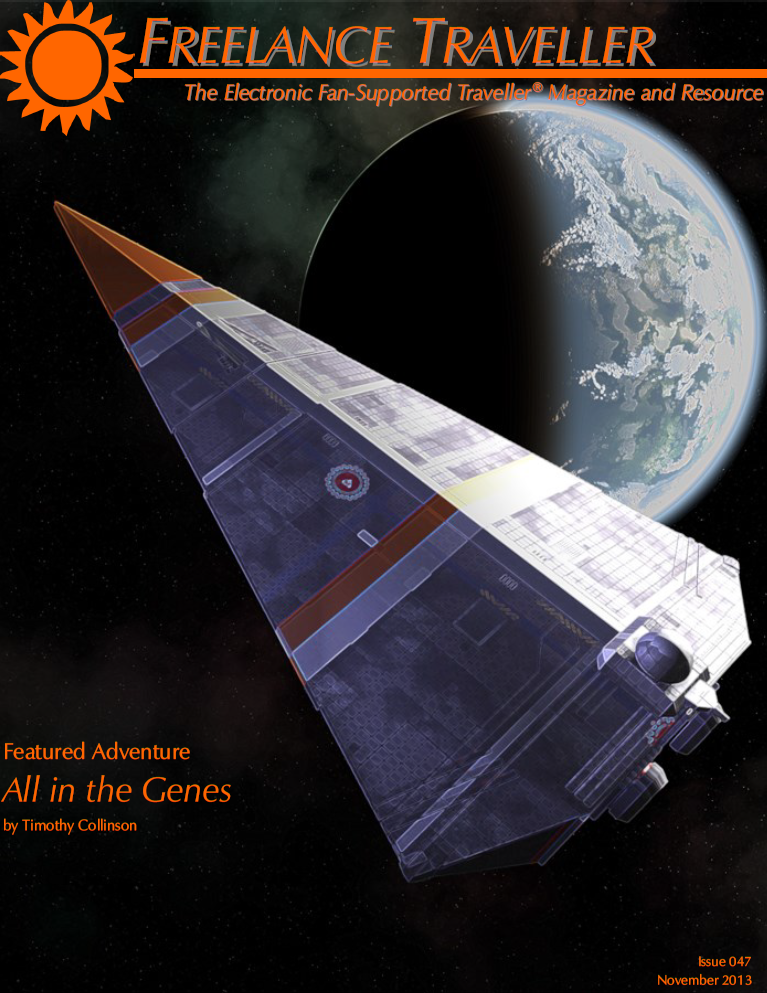| November 2013 | Department | Article Title | Author |
|---|---|---|---|
 |
From the Editor | Jeff Zeitlin | |
| Featured Article | |||
| Active Measures | All in the Genes | Timothy Collinson | |
| Critics’ Corner | Netherell | “kafka” | |
| Cirque | Jeff Zeitlin | ||
| Patron Encounters | Jeff Zeitlin | ||
| 21 Starport Places | “kafka” | ||
| Kurishdam | Lecture Hall and Library: Timekeeping in the Third Imperium | Guy Garnett | |
| Lecture Hall and Library: Common Languages of the Regency | Jeff Zeitlin | ||
| Up Close and Personal | Nooni Hendricksonne | Sam Swindell | |
| Raconteurs’ Rest | Funny Fish: Choices [Part 1] | Andrea Vallance | |
| Doing It My Way | Character Generation Rules: Investigator: A Basic Career for Classic Traveller | Michael Brown | |
|
Character Generation Rules:
Surgisilena (Also see Kurishdam: The Club Room: Surgisilena) |
Michael Brown | ||
| Confessions of a Newbie Referee | #5: Nervous Excitement | Timothy Collinson | |
Download this issue: ANSI A (US Letter) format or ISO A4 format
The articles listed and linked above are also linked in their appropriate sections of our website.
From the Editor
Last month, I started to describe how the changes of New Wave SF opened the field to the kind of stories that play to the strengths of Traveller and other RPGs.
The key change was that the focus on “ordinary people” made it easier for the reader to get emotionally involved with the character—to empathize with the character, and to place himself/herself in the character’s position, and understand the reactions, and react with the character. That, in turn, led to the fan-fiction phenomenon of the “Mary-Sue”, usually used derisively, but it has come to represent any ‘self-insertion’ by the author.
The role-playing character is, in a sense, the ultimate “Mary-Sue”. Regardless of where you feel your campaign stands on the GNS spectrum (and that’s a whole ’nother topic for future blathers), a campaign or a game session is a narrative, where the character’s actions and reactions are, ultimately, yours, and the characters are generally ‘a cut above’ the average Joe of the universe. Just like the “Mary-Sue”—but it’s not a bad thing in role-playing.
But Traveller’s strengths? Again, without getting into GNS discussions, Traveller, more than most of its contemporaries, tended to promote situations which, despite any SF-isms, were “plausibly realistic”, and in which “real people” would react to “real situations” and experience “real consequences” which just might not be what you wanted. It meant that player-characters were less likely to just go in, guns blazing, with only the most superficial of objectives; instead, you’d plan, or try to find alternatives, and in general act like real people in real situations. You’d also be less compelled to play archetypical characters, and you’d have the leeway to play a character with a prior career more to your tastes and inclinations. (more next month)
 Freelance
Traveller
Freelance
Traveller